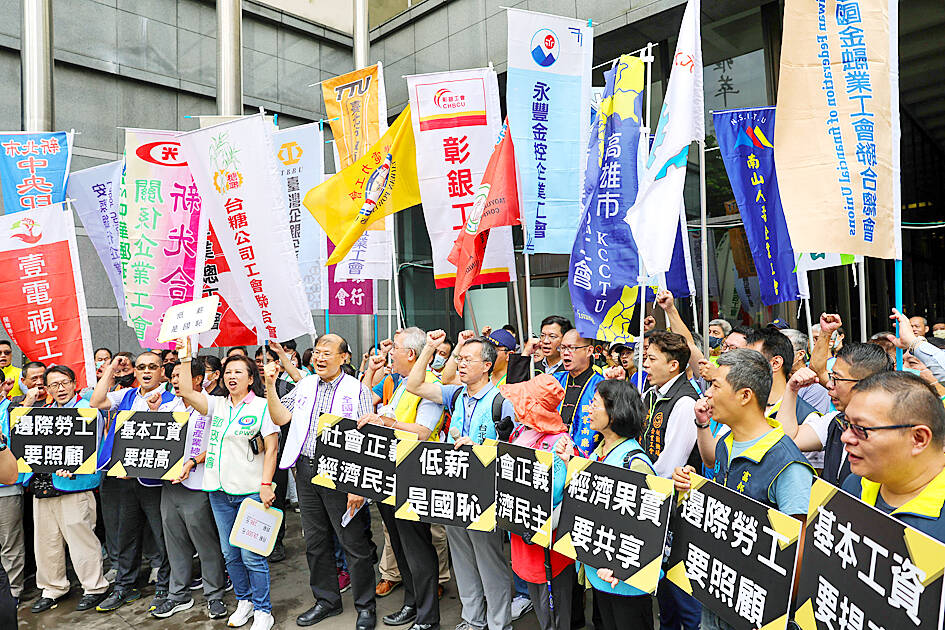The Ministry of Labor yesterday proposed raising the minimum wage by 4.05 percent next year in its efforts to help workers cope with surging inflationary pressure, marking an eighth straight annual increases if it is approved by the Executive Yuan.
It would mean the minimum wage would have surged more than 38 percent since 2016.
The ministry’s proposal came after the Basic Wage Commission concluded that the minimum monthly wage should be increased to NT$27,470 next year from NT$26,400 in response to surging inflation and higher prices of life’s necessities, a ministry statement said.

Photo: CNA
The hourly minimum wage should rise to NT$183 next year from NT$176, it said.
The commission, which is composed of government officials and representatives of workers and employers, believes that employers should share a fairer proportion of economic growth with their employees, the statement said.
About 2.39 million workers would benefit from the increase, the ministry said.
The consumer price index (CPI) last month advanced 2.52 percent year-on-year, exceeding the central bank’s target of 2 percent, as summer vacations drove entertainment costs higher, while bad weather pushed up food prices, the Directorate-General of Budget, Accounting and Statistics said.
The minimum wage increase of 4.05 percent is lower than the 6 percent requested by the Taiwan Confederation of Trade Unions (全國產業總工會), but the labor association considered a 4 percent increase acceptable.
Local industrial groups yesterday said that the proposed increase greatly exceeded their expectation, as the service sector and exporters are still slowly recovering from the adverse impact of the COVID-19 pandemic over the past three years.
Local businesses are also facing pressures from soaring operating costs and dim economic prospects, General Chamber of Commerce (商業總會) president Paul Hsu (許舒博) said in a statement yesterday.
Geopolitical tensions have also pushed up costs of energy and raw materials, Hsu said.
The chamber is concerned that faster-than-expected minimum wage increases could further stoke inflation, as increased labor costs would add to the already high cost structure, Hsu added.
The Chinese National Association of Industry and Commerce (CNAIC, 工商協進會) said that higher labor costs would stoke inflation and therefore lessen the benefits of the rise in salaries.
Local businesses are facing mounting pressure to manage costs, the CNAIC said, adding that they also have to allocate extra spending on carbon emission reductions as fighting climate change becomes a trend and responsibility.
To mitigate surges in operational costs, the CNAIC suggested that the government should consider maintaining electricity rates at a meeting to be held later this month. It also suggested extending the tax breaks on imports of key raw materials.

NEXT GENERATION: The four plants in the Central Taiwan Science Park, designated Fab 25, would consist of four 1.4-nanometer wafer manufacturing plants, TSMC said Taiwan Semiconductor Manufacturing Co (TSMC, 台積電) plans to begin construction of four new plants later this year, with the aim to officially launch production of 2-nanometer semiconductor wafers by late 2028, Central Taiwan Science Park Bureau director-general Hsu Maw-shin (許茂新) said. Hsu made the announcement at an event on Friday evening celebrating the Central Taiwan Science Park’s 22nd anniversary. The second phase of the park’s expansion would commence with the initial construction of water detention ponds and other structures aimed at soil and water conservation, Hsu said. TSMC has officially leased the land, with the Central Taiwan Science Park having handed over the

The Philippines is working behind the scenes to enhance its defensive cooperation with Taiwan, the Washington Post said in a report published on Monday. “It would be hiding from the obvious to say that Taiwan’s security will not affect us,” Philippine Secretary of National Defense Gilbert Teodoro Jr told the paper in an interview on Thursday last week. Although there has been no formal change to the Philippines’ diplomatic stance on recognizing Taiwan, Manila is increasingly concerned about Chinese encroachment in the South China Sea, the report said. The number of Chinese vessels in the seas around the Philippines, as well as Chinese

AUKUS: The Australian Ambassador to the US said his country is working with the Pentagon and he is confident that submarine issues will be resolved Australian Ambassador to the US Kevin Rudd on Friday said that if Taiwan were to fall to China’s occupation, it would unleash China’s military capacities and capabilities more broadly. He also said his country is working with the Pentagon on the US Department of Defense’s review of the AUKUS submarine project and is confident that all issues raised will be resolved. Rudd, who served as Australian prime minister from 2007 to 2010 and for three months in 2013, made the remarks at the Aspen Security Forum in Colorado and stressed the longstanding US-Australia alliance and his close relationship with the US Undersecretary

‘WORLD WAR III’: Republican Representative Marjorie Taylor Greene said the aid would inflame tensions, but her amendment was rejected 421 votes against six The US House of Representatives on Friday passed the Department of Defense Appropriations Act for fiscal 2026, which includes US$500 million for Taiwan. The bill, which totals US$831.5 billion in discretionary spending, passed in a 221-209 vote. According to the bill, the funds for Taiwan would be administered by the US Defense Security Cooperation Agency and would remain available through Sept. 30, 2027, for the Taiwan Security Cooperation Initiative. The legislation authorizes the US Secretary of Defense, with the agreement of the US Secretary of State, to use the funds to assist Taiwan in procuring defense articles and services, and military training. Republican Representative